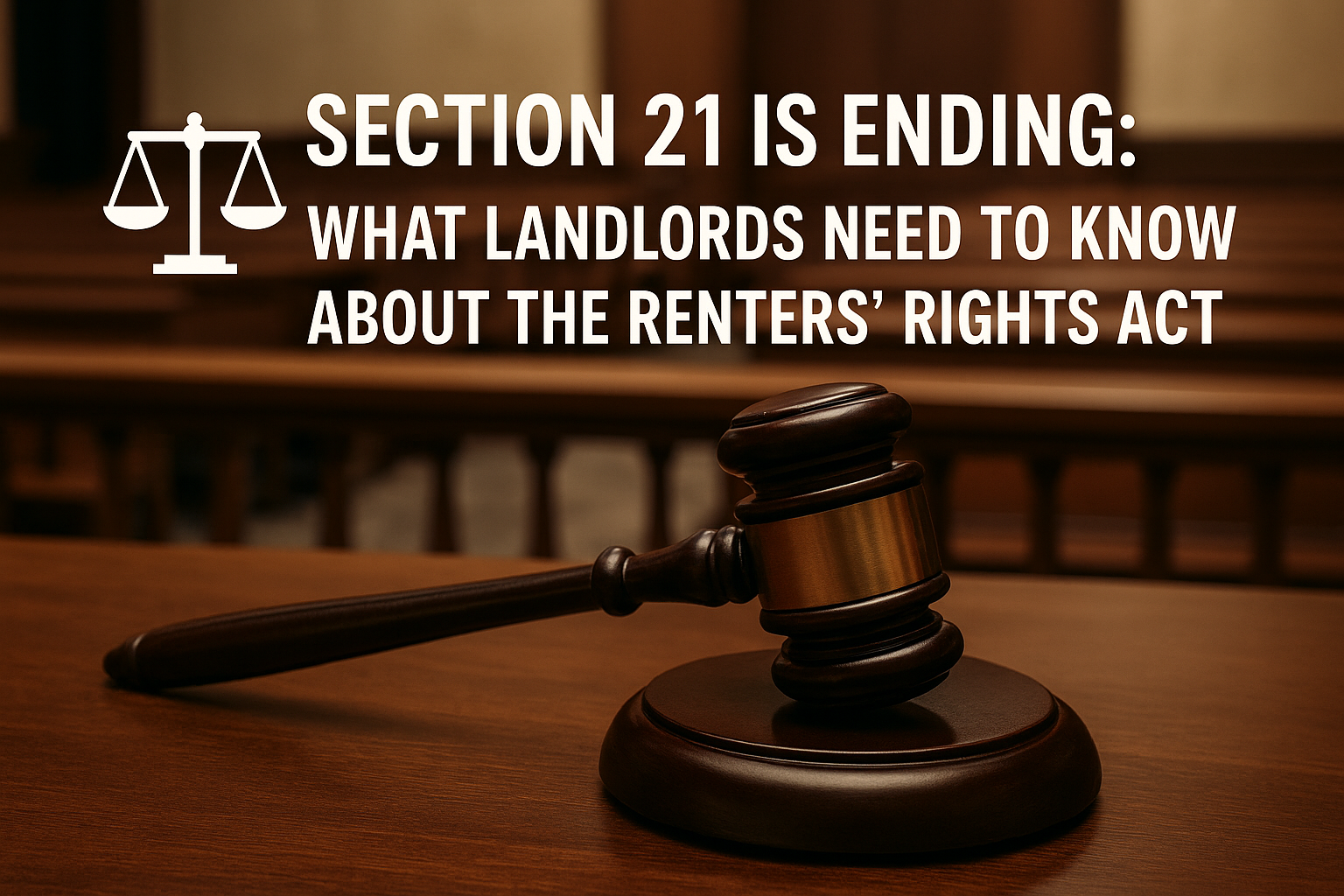Section 21 Is Ending: What Landlords Need to Know About the Renters’ Rights Act
Big changes are coming to the private rental sector. The Renters’ Rights Bill, which is currently moving through Parliament, is expected to become law in late 2025, with most reforms likely to take effect from early 2026.
At the heart of these reforms is the abolition of Section 21 – often called the “no-fault eviction” rule. This is one of the biggest shifts in landlord and tenant law for decades, and it will affect almost every landlord in England.
So what does this mean in practice? How will it impact landlords who own buy-to-lets, student properties, short-term lets, or even holiday homes? Let’s break it down clearly.
What is Section 21?
Currently, Section 21 of the Housing Act 1988 allows landlords to evict tenants at the end of a fixed-term tenancy (or during a periodic tenancy) without giving a reason, provided the correct notice is served.
It has been widely used as a tool for regaining possession quickly and flexibly. However, critics argue it has contributed to rental insecurity and homelessness, with tenants feeling they could be asked to leave at any time, even if they have done nothing wrong.
What’s Changing Under the Renters’ Rights Act?
Once the Bill receives Royal Assent, Section 21 will be scrapped, and a new framework will replace it.
Here are the key changes:
End of Section 21: Landlords will no longer be able to evict tenants without a legal reason.
All tenancies become periodic: Fixed-term assured shorthold tenancies (ASTs) will be replaced with open-ended periodic tenancies.
New rules for rent increases: Rents can only be increased once per year using a Section 13 notice, with 2 months’ notice. Tenants can challenge increases at tribunal if they feel they are unfair.
Tenant notice periods: Tenants must give at least 2 months’ notice when leaving.
Advance rent: Landlords cannot ask for more than one month’s rent upfront.
This is designed to give tenants more security while ensuring landlords still have legal grounds to recover their properties where justified.
What Grounds Will Landlords Be Able to Use?
With Section 21 gone, landlords will need to rely on Section 8 of the Housing Act, which lists legal grounds for possession. These include:
Rent arrears
Breach of tenancy (e.g. damage to the property)
Landlord wanting to move in themselves or sell the property
Serious anti-social behaviour
The Government has said it will strengthen and simplify some of these grounds, particularly around anti-social behaviour and selling a property, so landlords still have routes to repossession.
What Does This Mean for Different Types of Landlords?
1. Buy-to-Let / Long-Term Tenancies
If you rent out on a standard AST, this reform affects you directly. You will need to update your tenancy practices and be prepared to use Section 8 grounds if you want to regain possession.
2. Student Accommodation
Many student lets currently use fixed-term ASTs, tied to the academic year. Under the new system, all student tenancies will become periodic. However, the Government has acknowledged the importance of the student rental market and is considering bespoke rules to ensure properties can still be available in line with university timetables. Landlords in this market should watch closely for updates on transitional arrangements.
3. Short-Term Lettings (e.g. Airbnb, serviced accommodation)
Most short-term lettings (where no assured shorthold tenancy is in place) will not fall under the Renters’ Rights Act in the same way as standard ASTs. If your property is genuinely let on a short-stay or holiday basis, the reforms may not apply.
However, if you use rolling contracts or longer-term agreements without clear AST documentation, you could be caught by the new regime. It’s crucial to review your contracts and seek advice to ensure clarity.
4. Holiday Homes
Properties let exclusively as holiday homes (e.g. weekly or seasonal bookings) are generally not classed as ASTs. These types of lets should remain outside the scope of the Renters’ Rights Act. But again, landlords should ensure they use the correct legal agreements to avoid confusion.
When Will This Happen?
Royal Assent: Expected in late 2025
Implementation: Likely early 2026
Transitional arrangements: The Government will set out how existing ASTs and Section 21 notices will be handled once the law comes into force.
What Should Landlords Do Now?
Review your contracts: Ensure you are using the correct tenancy or licence agreements, especially for short-term lets and student rentals.
Brush up on Section 8: Familiarise yourself with the new grounds for possession and how to evidence them.
Improve record-keeping: Documentation will become even more important in proving grounds for possession.
Plan for longer notice periods: Build flexibility into your cashflow planning and investment strategy.
Stay informed: The final details are still being confirmed, and student housing rules in particular may be refined.
The abolition of Section 21 is a landmark moment in the private rental sector. For landlords, it means adjusting to a new way of managing tenancies, with more emphasis on transparency, compliance, and fair practice.
If you own student property, short-term lets, or holiday homes, the impact may vary — but the key is to get your contracts right and keep an eye on how the final law is written.
Landlords who prepare early and adapt to the new system will be in the strongest position to protect their investments while maintaining good relationships with tenants.


